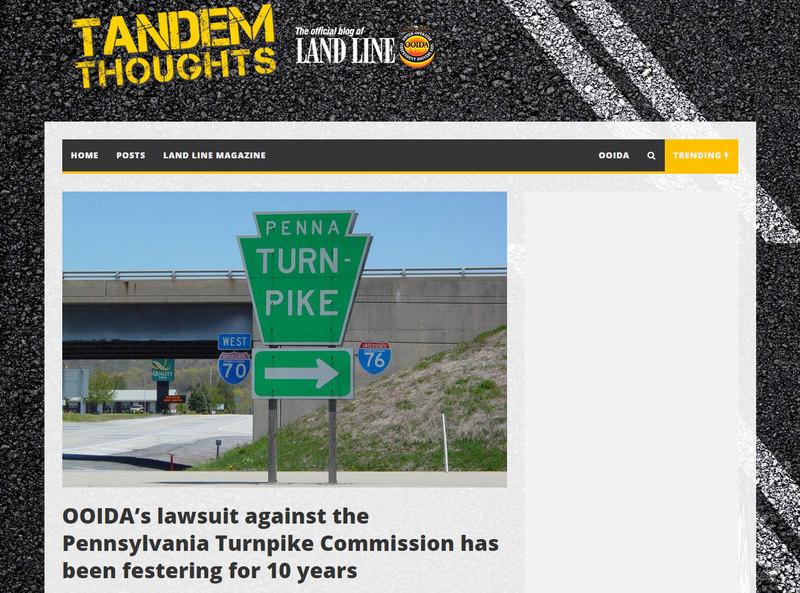OOIDA’s lawsuit against the Pennsylvania Turnpike Commission has been festering for 10 years
The class action lawsuit brought by the Owner-Operator Independent Drivers Association against the Pennsylvania Turnpike Commission has been a long time coming.
There are plenty of reasons to oppose toll roads, and the Pennsylvania Turnpike Commission epitomizes almost all of them. Fear not, though. I will save some fury for another posting.
In a lawsuit filed in March, OOIDA argues that repeated and high toll increases unduly burden interstate commerce. OOIDA also objects to toll revenue paying for projects unrelated to the turnpike. The National Motorists Association joined OOIDA in the lawsuit.
With the lawsuit, OOIDA also pushes for an injunction to stop the Turnpike Commission’s overcharging to pay for projects not related to the turnpike. The injunction would also stop the turnpike from borrowing money to make PennDOT payments and prevent PennDOT from spending the money. If all goes the way OOIDA wants, the Turnpike Commission would refund money to turnpike users.
When the Turnpike Commission became a Frankenstein
The root of the problem dates to July 2007. That is when the Pennsylvania General Assembly approved Act 44. That legislation unleashed the Turnpike Commission’s revenue stream. It no longer had to pay for only constructing, operating and improving the Pennsylvania Turnpike. It instead could be spent on other transportation needs.
The politicians also could beat their chests about not raising taxes, yet they still magically had money to spend.
Act 44 also called for tolls on I-80, but the Federal Highway Administration said no in April 2010. The FHWA objected to toll revenue being diverted from I-80 projects and upkeep.
This time, the feds got something right.
But Act 44 wasn’t enough. In November 2013, legislators passed Act 89, which requires the Turnpike Commission to fork over $450 million annually to PennDOT. What’s more, none of the money has to pay for highways or bridges. The money can go to multimodal or mass transit projects or to pay state troopers.
Almost like a holiday tradition, Land Line Magazine has announced annual Pennsylvania Turnpike toll increases. The toll increase in January was the 10th. Land Line announced it with the line, “It’s that time of year in Pennsylvania: toll increases.”
Turnpike Commission is ticking off lots of drivers
OOIDA and its lawsuit compatriot are not alone in decrying the Turnpike Commission’s toll increases.
In March, Pittsburgh’s TribLive.com posted a story under the headline “Drivers claim Pennsylvania Turnpike toll hikes are ‘highway robbery.'” In the article, they tell about a Pennsylvania Turnpike user who created an internet meme reading “Pennsylvania Turnpike: re-inventing highway robbery since 2009.”
The article also mentions Pat Riggle of P&B Transportation rerouting his company’s 50 tractor-trailers hauling coal, steel and gravel across the eastern U.S. around the Pennsylvania Turnpike.
Another Pittsburgh publication a little more than a year ago called for the repeal of Act. 44.
“Act 44 is rapidly bankrupting the Pennsylvania Turnpike Commission, threatening the commission’s ability to maintain the safety of our crucial turnpike system,” says Jim Mall of the Pittsburgh Post-Gazette in late 2016.
OOIDA has advocated to repeal Act 44 since the law was created.
OOIDA’s Lawsuit against the Turnpike Commission
In a document filed with OOIDA’s lawsuit against the Turnpike Commission, OOIDA’s attorneys listed some relevant precedents.
In a 2016 case, the American Trucking Associations sued the New York State Thruway for purposefully inflating toll revenue so it could be diverted to improve and maintain the New York State Canal System. The court declared the tolls unconstitutionally excessive. Further, it said the tolls were paying for things that are “irrelevant when sitting in the cab of an 18-wheeler.”
Another case cited dealt with a ferry operation connecting Bridgeport, Conn., and Port Jefferson, N.Y. The Bridgeport Port Authority used passenger fees to pay for the economic development of the harbor and waterfront area. The court ruled that ferry passengers did not benefit from the facilities paid for by the toll, or passenger fees. Therefore, the tolls were not permissible.
Mentions
States
- Pennsylvania
Securities Disclaimer
This website is for informational purposes only and does not constitute an offer or solicitation to sell shares or securities. Any such offer or solicitation will be made only by means of an investment's confidential Offering Memorandum and in accordance with the terms of all applicable securities and other laws. This website does not constitute or form part of, and should not be construed as, any offer for sale or subscription of, or any invitation to offer to buy or subscribe for, any securities, nor should it or any part of it form the basis of, or be relied on in any connection with, any contract or commitment whatsoever. EB5Projects.com LLC and its affiliates expressly disclaim any and all responsibility for any direct or consequential loss or damage of any kind whatsoever arising directly or indirectly from: (i) reliance on any information contained in the website, (ii) any error, omission or inaccuracy in any such information or (iii) any action resulting therefrom.




